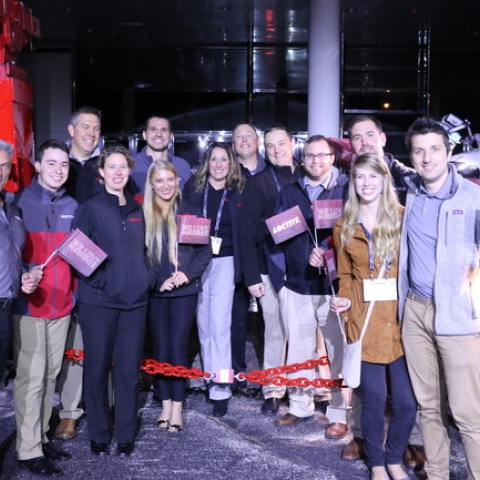Putting the Experience into Experiential Marketing with Dan Hilbert, SVP of GES Events

“Experiential marketing” is a phrase that has been thrown around quite a bit within the events industry over the past ten years.
According to Wikipedia, experiential marketing is a marketing strategy that directly engages consumers and invites and encourages them to participate in the evolution of a brand or a brand experience. Rather than looking at consumers as passive receivers of messages, engagement marketers believe that consumers should be actively involved in the production and co-creation of marketing programs, developing a relationship with the brand.
Of course, Wikipedia also says that experiential marketing is synonymous with engagement marketing, event marketing, on-ground marketing, live marketing, participation marketing, or special events – which in reality are not necessarily the same things at all.
Dan Hilbert, senior vice president of GES Events, has a deep understanding of experiential marketing and what it takes to make clients successful. Hilbert has more than 25 years’ experience in the event, agency, and entertainment business. Prior to joining GES Events, he was senior vice president of client engagement & strategy at TBA Global, and has also held senior level positions both at other agencies and with Live Nation Entertainment, Ryan Partnership, Unilever and Labatt, USA.
I asked Hilbert for his definition of experiential marketing. He turned it around, saying that it is better to start with what it is not: and it is not a passive marketing activation.
“It’s not TV advertising, social media, public relations where the marketing is coming from the brand to the consumer or customer,” Hilbert explained.
He continued, “Experiential marketing is a partnership, an event that brings the brand and the customer together on both a practical level and an emotional level.”
The practical encompasses education, sales, demonstrations…areas that are ultimately commercially driven by the brand. The emotional comprises networking and community. The idea is that the attendees will leave with what Hilbert calls a sense of advocacy for that particular brand, company, or organization.
In order to get that community feeling, the event needs to be designed in a certain way. Experiential marketing encompasses everything from crafting the right attendee journey, to stage and scenic design, content development, technology and measurement.
From Hilbert’s perspective, that starts with the objective of the client. That may be awareness of a particular brand or product, or it could be education and training, where the objective is to enhance the attendees’ knowledge.
Hilbert says that GES Events has three tenets when it comes to experiential event design:
- Make a space into a place.
- Make sure an event becomes a community.
- Make the message within the event become a movement.
From a strategic level, he says, the approach GES Events takes is to work with those objectives and understand what the right type of community is to create. The strategy team works with the brief from the client to determine an inspirational environment that will bring people together. That strategy then informs the event design.
Design brings the strategy and objectives to life, resulting in an event in which content, brand, tone, look and feel are all delivered in a consistent and powerful way.
The final piece is production. To excel at large-scale event production, says Hilbert, requires a different skill set – or sets of skills - than people may think. As each event requires customization, more innovation and creativity comes into play. Engineers and structural engineers may need to be involved to come up with solutions for custom pieces. Then there are the people who understand the content and technology, a technical director, stage managers, people from theater even know how to cue and spot presentations, etc.
One example of how GES Events has put this into practice is delivering a custom experience for Loctite, at the Assembly Show this past October in Rosemont, Illinois. The client brief was to draw attention to the superior performance of their industrial adhesive, through a “wow” experience.
GES Events delivered this experience in the form of a “truck pull.” Trailers were wrapped with Loctite logos and graphics. A double-trailer semi-tractor with a 9 square-inch adhesive surface was pulled, using a tow truck. This took place outdoors, but there was also a tented reception that included a product overview and local-to-the-Chicago-area foods.
The event was live streamed on Facebook, and received a highly positive, engaged response. Attendees who saw the truck pull live were also impressed and enthusiastic. And most importantly, the client was happy.
“[GES Events was an] incredible partner throughout the process - contributing to the strategy, organization and production,” said Keena Toth, Loctite Director of Global Marketing Communications.
This ties into what Hilbert calls “analog love”. He says that even at events for the most highly technical audiences, the simple things are getting the highest attendance and engagement. This could be something as simple as a ping-pong table or corn hole beanbag game. Even with digital options, people are choosing the non-tech activities as it is more organic and provokes emotion.
I asked Hilbert if he had any words of wisdom to share based on his experience.
“People are people. B2B, B2C …whatever your target audience, we’re all human and we’re all emotional beings,” he said.
“We’re all about sight, sound, smell, taste….and you need to balance that analog love with all the technological options that are out there. Events may be business but they need to be fun and imaginative to inspire people – never forget that.”


Comments
Thanks for sharing! I found…
Thanks for sharing! I found this very insightful and helpful! I work in the health care industry as an event specialist so I'm always looking for new ideas and ways to create an engaged community at each of our events.
Thanks again!
Add new comment